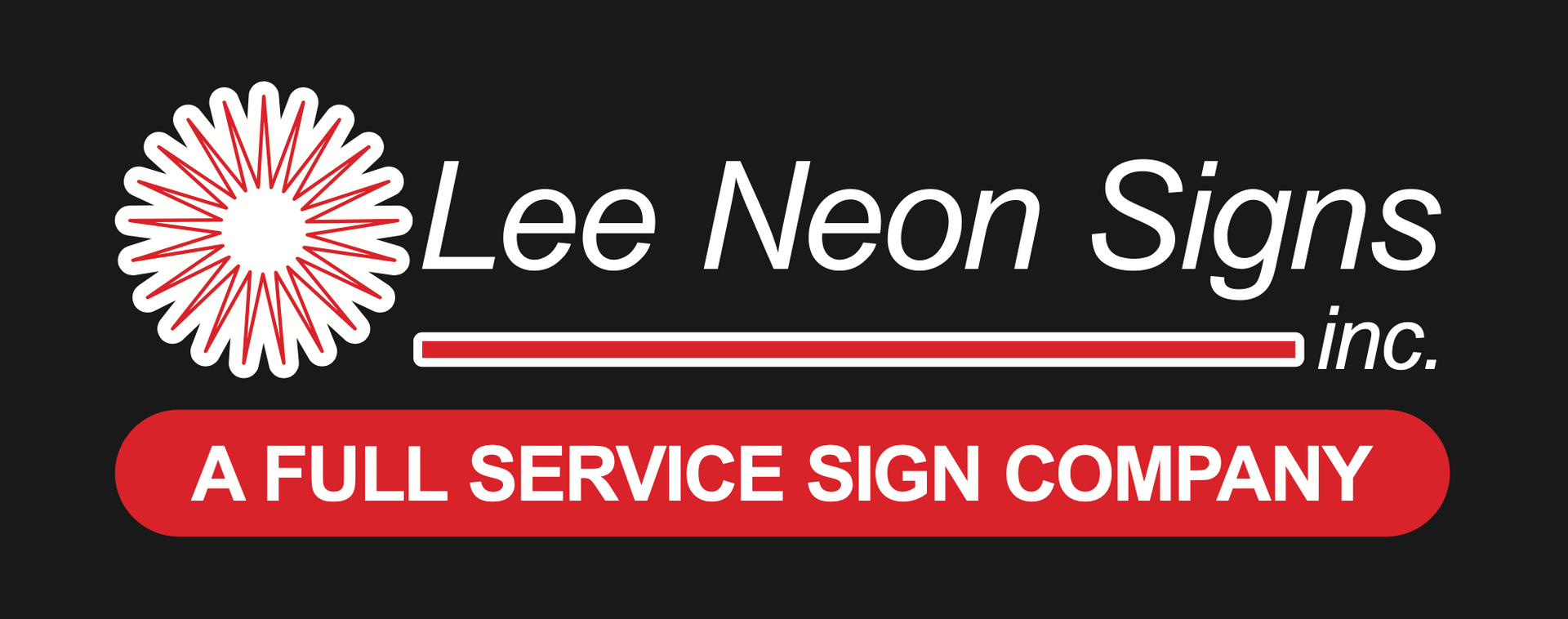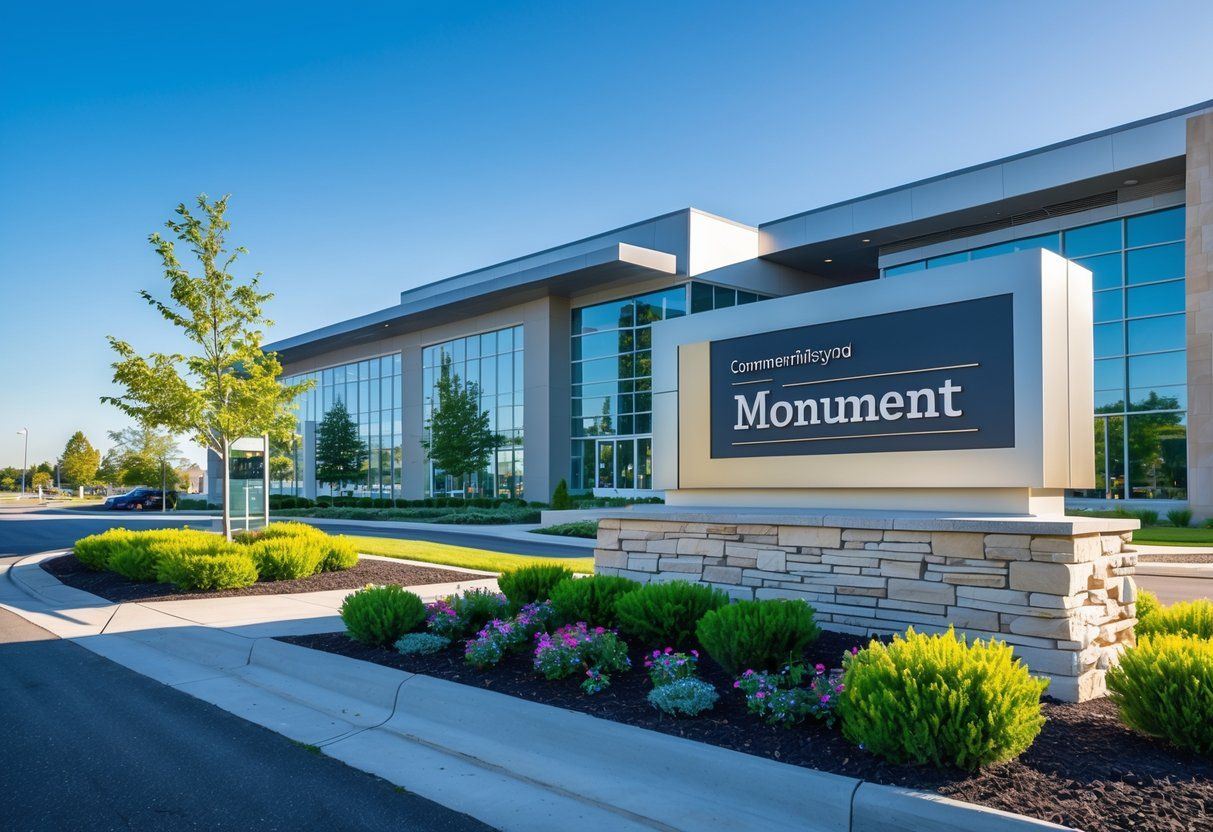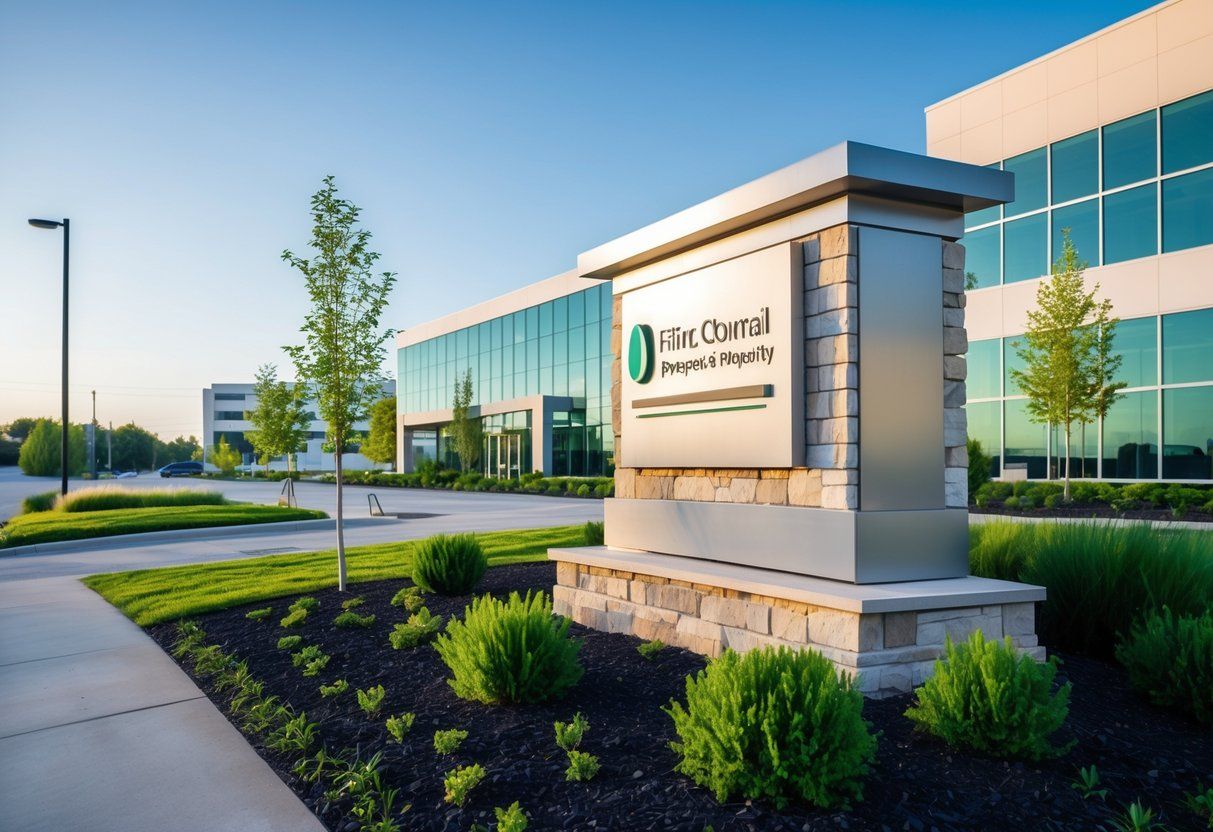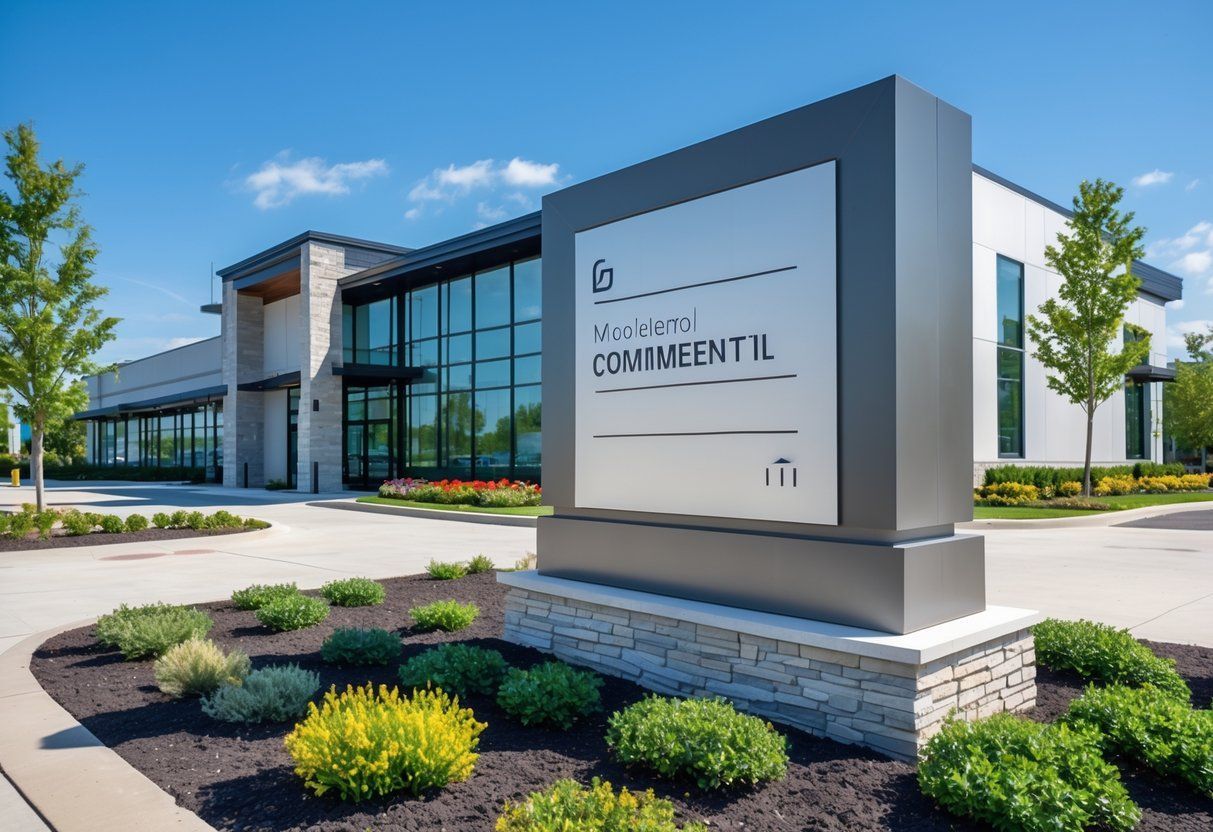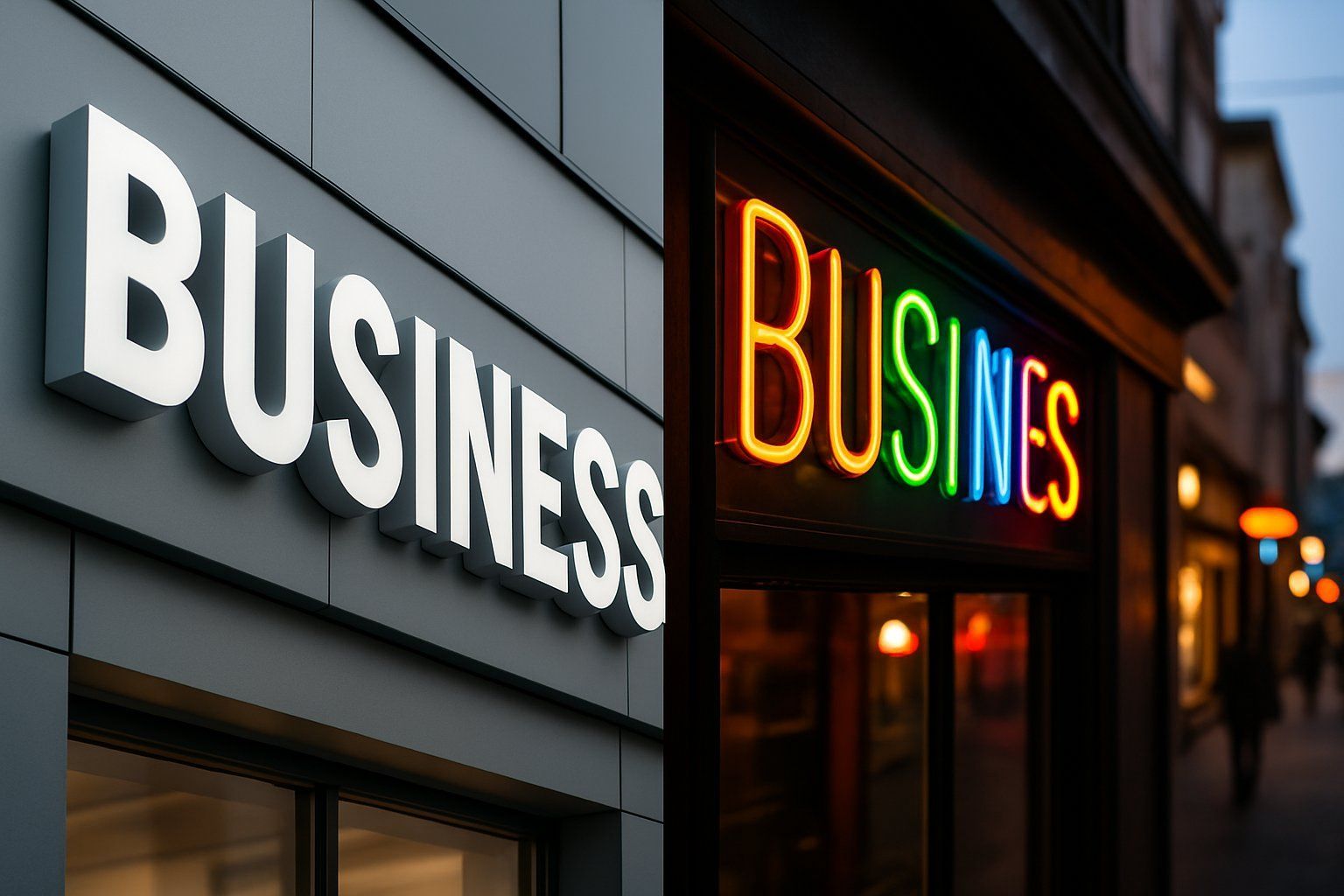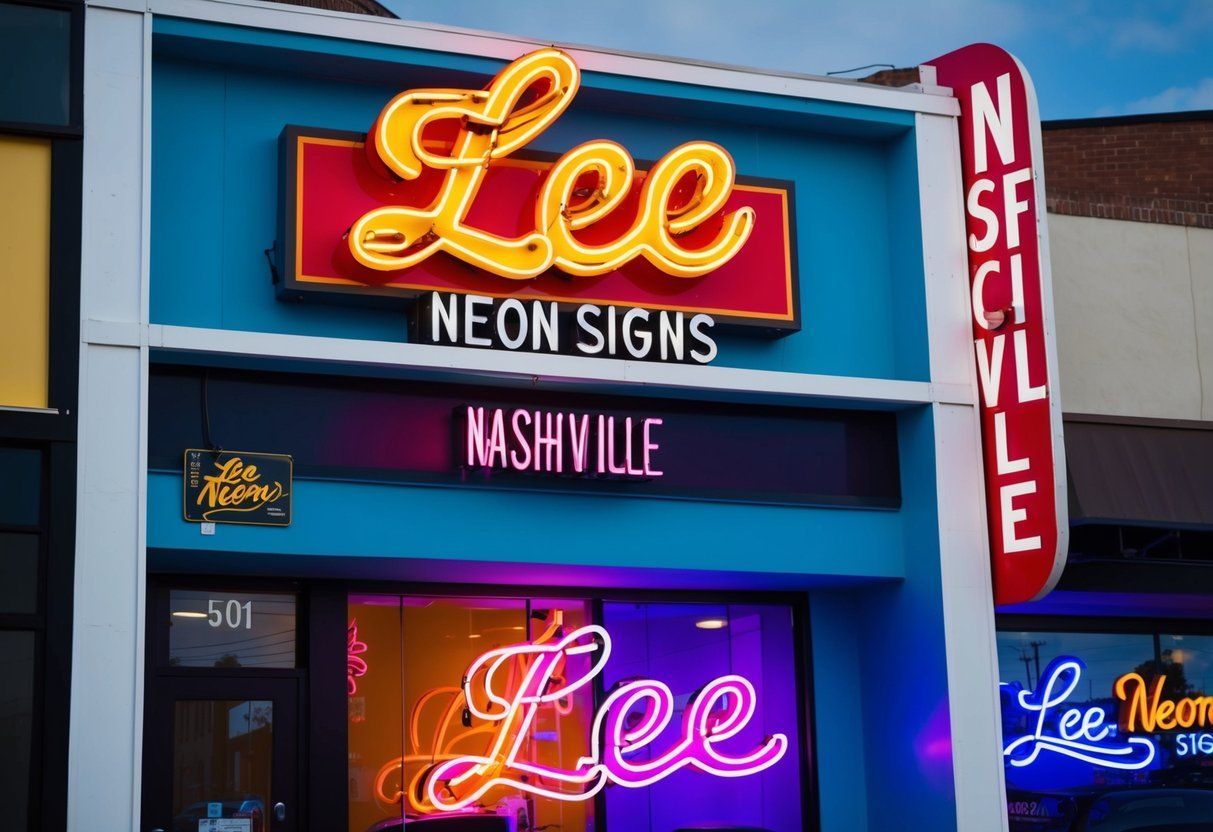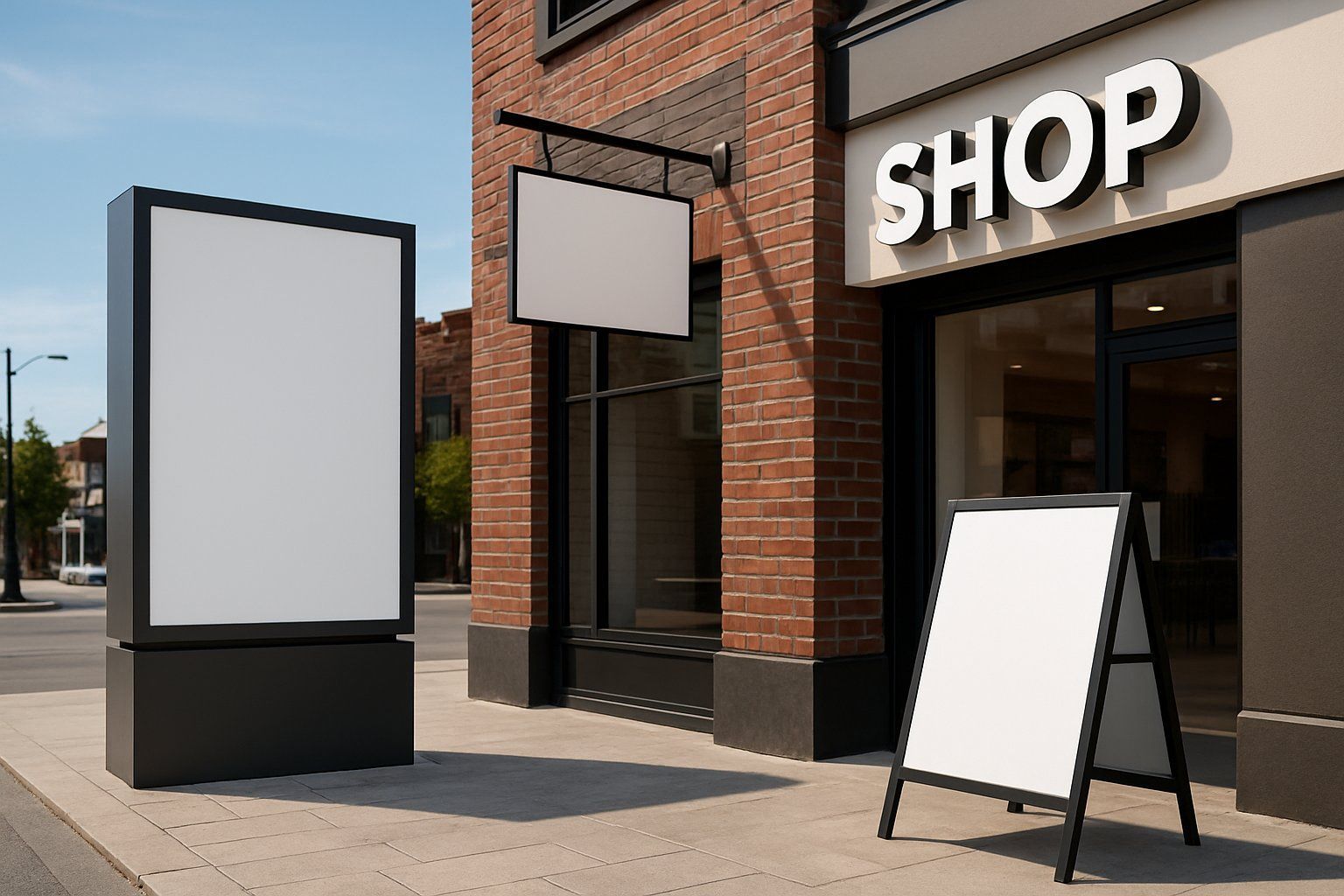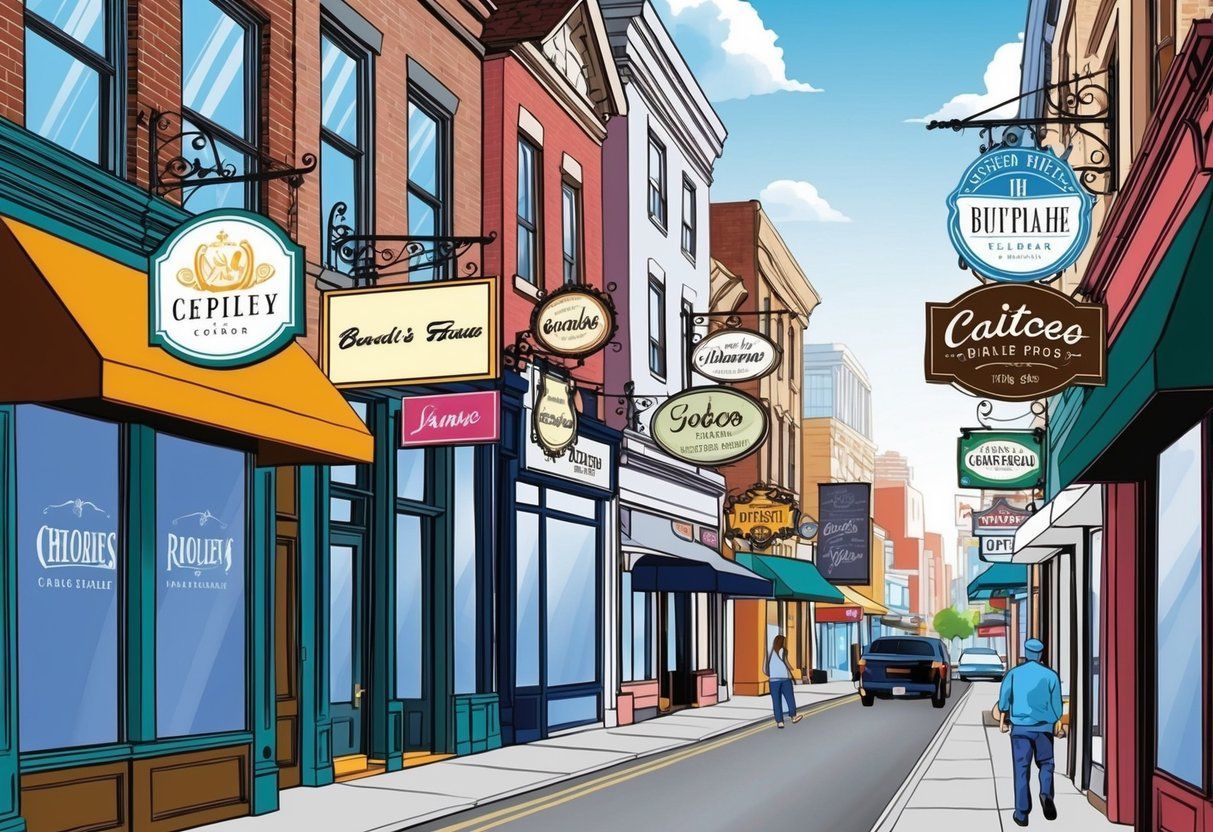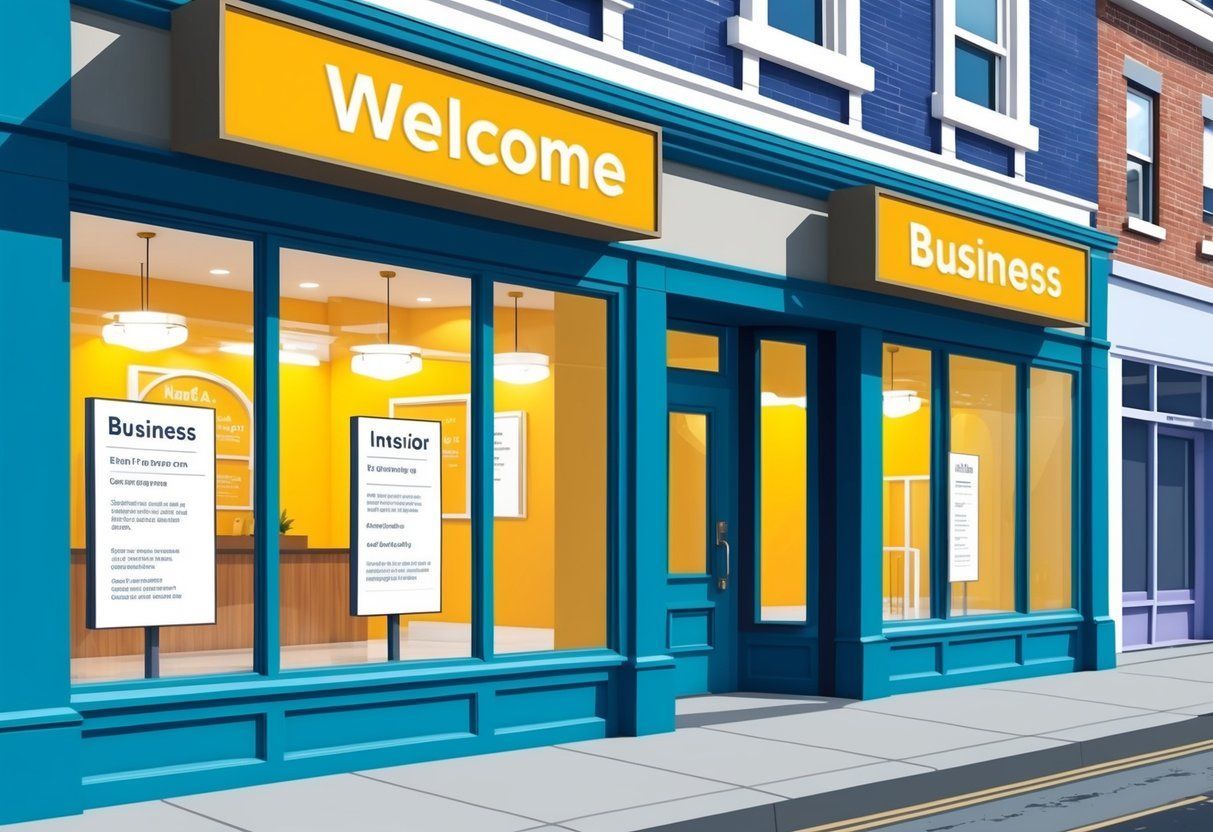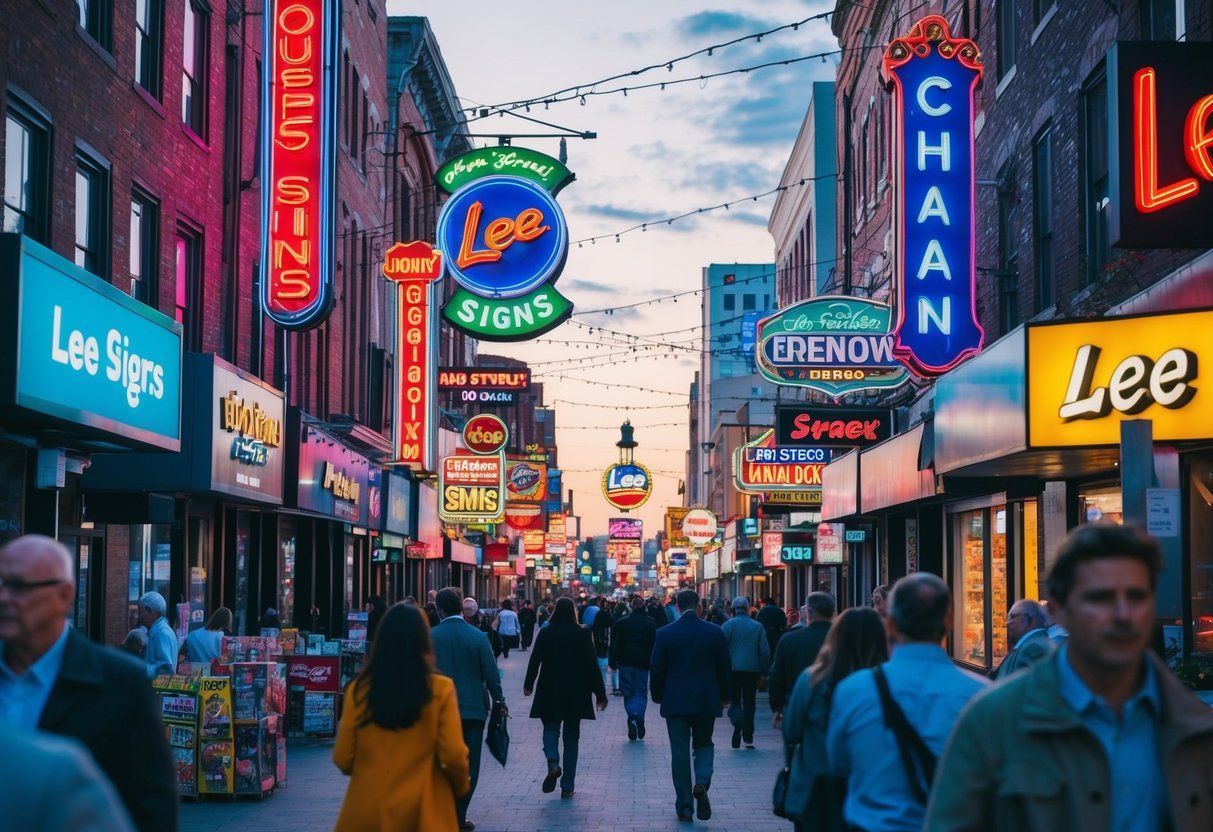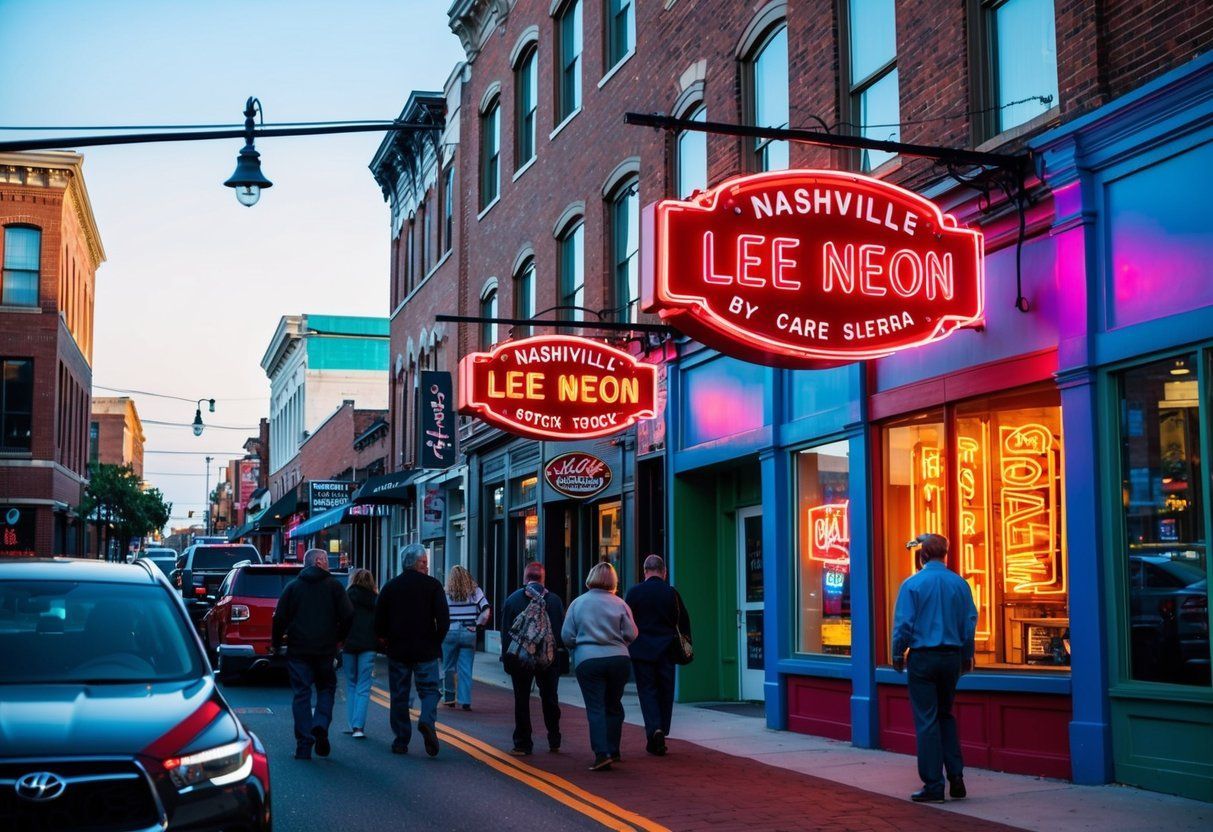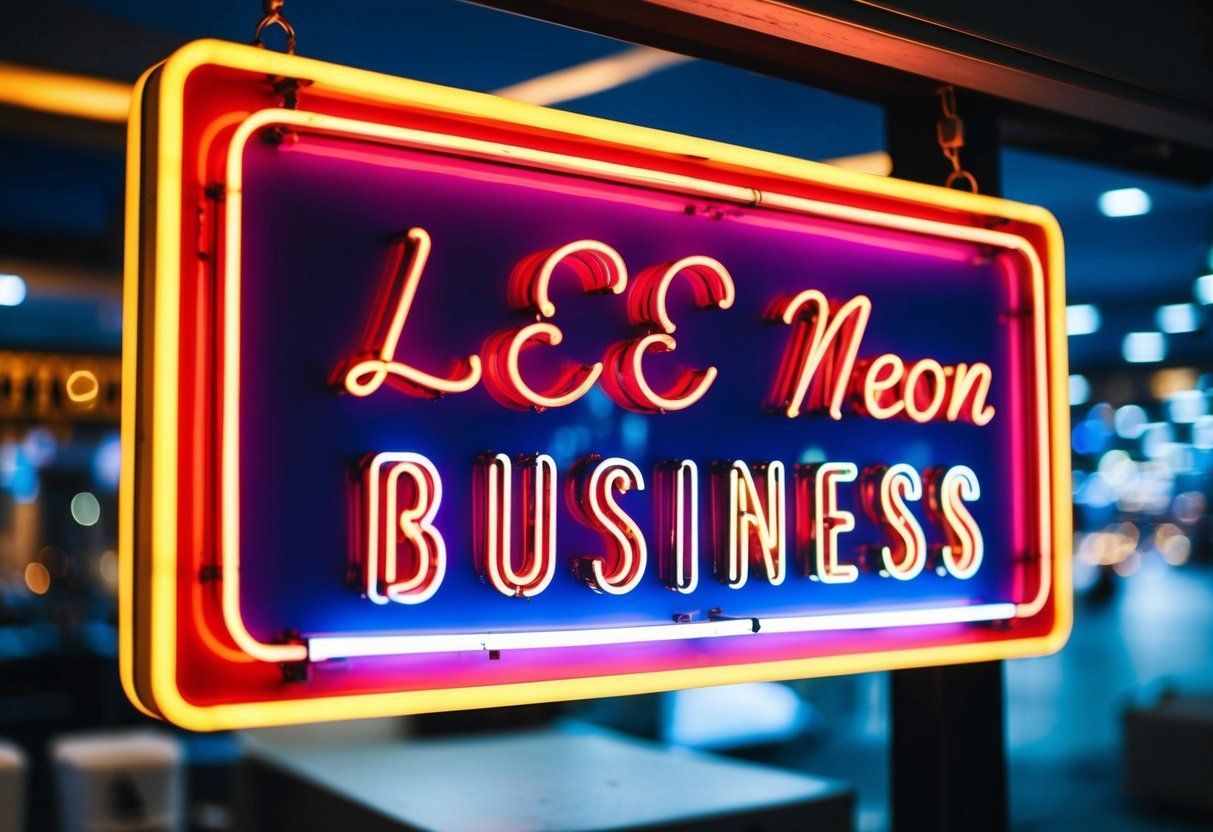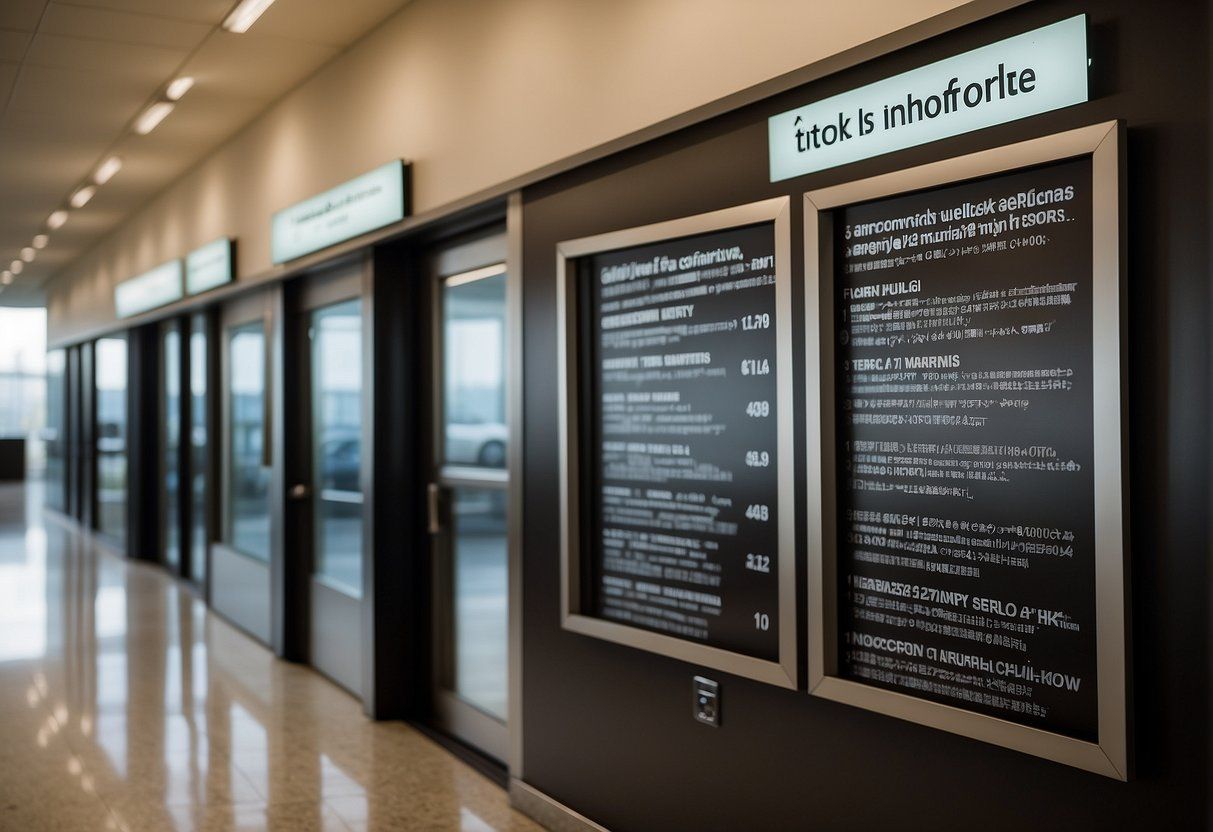Monument signs can make a big impact on commercial properties by helping people find and remember a business. A well-designed monument sign increases a property’s visibility, makes a professional first impression, and can support higher property values over time.
Many property owners and managers use these signs because they help attract more visitors and tenants.
Unlike banners or other temporary signs, monument signs
are built to last. They come in many styles and materials, so property owners can pick an option that fits their building and budget.
This long-term investment not only marks the location but also helps promote the brand and boost business every day.
Key Takeaways
- Monument signs improve property visibility and recognition.
- They add long-term value by lasting through weather and time.
- Good signage helps attract new business and tenants.
Understanding Monument Signs
Monument signs are a type of outdoor signage
designed to be noticeable and functional at eye level. They help commercial properties boost visibility, deliver key information, and create a lasting impression for customers and visitors.
What Are Monument Signs?
Monument signs
are freestanding signs
usually placed near entrances of businesses or commercial properties. Unlike other business signage
, they sit low to the ground, typically between 3 and 6 feet tall.
These signs are built from materials like brick, stone, metal, or concrete. Many monument signs use large, readable text
that makes it easy for passersby to spot a company’s name, logo, and address.
Businesses choose monument signs because they are sturdy and weather-resistant. They require little maintenance and can last many years.
Property managers often use them for shopping centers, office parks, schools, and hospitals.
Key features of monument signs:
- Low to the ground
- Solid, permanent base
- Customizable shapes and finishes
- Good visibility for cars and pedestrians
Differences Between Monument Signs and Pylon Signs
Pylon signs
and monument signs both serve as outdoor signage, but they have distinct differences. Pylon signs
are much taller, often mounted on one or two poles.
They usually stand 20 feet high or more, making them visible from long distances or highways. Monument signs, on the other hand, are positioned at eye level.
This makes them easier to read up close, but they might not reach drivers far down the road. Pylon signs are commonly used at gas stations, shopping plazas, or along busy roads where height is important.
| Feature |
Monument Signs |
Pylon Signs |
| Height |
3-6 feet |
20 feet or more |
| Base |
Solid, wide |
Pole or narrow base |
| Visibility |
Local traffic/pedestrians |
Highway and distant views |
| Best for |
Business fronts |
Shopping centers, gas stations |
Enhancing Property Value with Monument Signs
Monument signs play a key role in attracting attention
to commercial properties. These signs help set a business apart and can influence how customers and clients view the site.
Impact on First Impressions
A well-designed monument sign is often one of the first things people notice when they visit a property. Its appearance sets expectations for the business and can build trust.
A clean, clear sign can show that the company pays attention to detail. This helps to create a positive image
and gives visitors confidence in the services and products offered.
Many businesses use monument signs to target new customers by making the location easy to find. Visibility is another important benefit.
Monument signs placed near entrances or roads help drivers and pedestrians identify a property quickly. This can make the business stand out from the competition.
Long-Term Benefits of Monument Signs
Monument signs are built to last, often using materials like stone, brick, or metal. These materials resist weather and require less upkeep over time.
Durability helps businesses save money because signs do not need frequent replacements. Properly made monument signs stay readable and professional-looking for many years, reducing the risk of fading or damage from sunlight or rain.
These signs can also adapt to changes, such as new branding or renovations. A sturdy sign keeps its structure and can be updated with new graphics or colors, supporting business growth and changes.
Professional Appearance for Commercial Properties
Monument signs give commercial properties a professional look
that builds credibility. An organized, attractive sign suggests that the business is invested in its reputation.
Professional appearance can attract quality tenants to shopping centers, medical offices, and business parks. Often, tenants prefer locations that look reputable and well cared for.
The following checklist shows how monument signs support professional appearance:
- Clear, readable lettering
- Consistent colors with branding
- Quality construction
- Regular cleaning and maintenance
Visibility and Brand Exposure
Monument signs provide a consistent way to increase brand exposure
and help businesses stand out in crowded locations. These signs serve as important tools for brand visibility, especially in shopping centers and commercial areas.
Increasing Brand Recognition
Monument signs help people recognize a brand quickly. When a logo, color scheme, or familiar font is used, visitors start to connect those visuals with a specific business.
Large, well-placed signs at entrances or main roads make it easy for new or returning customers to spot a business. This helps to build trust as customers come to expect a dependable look for the business.
The more often people see the same sign, the more likely they are to remember the business later. For example, someone passing a sign every day may think of that store first when shopping is needed.
Enhanced Visibility at Key Locations
High-traffic areas, like busy streets and shopping centers, give monument signs greater impact. Placing a sign at a property entrance or corner boosts visibility to both foot traffic and vehicles.
Monument signs are usually low and wide, making them easy to read from a distance. Clear lettering and lighting can ensure the sign is visible day and night, even in poor weather.
Local zoning rules often allow monument signs to be placed closer to roadways than other sign types. This increases the chances that the sign will catch the attention of drivers and pedestrians as they pass by.
Customized Sign Design for Brand Identity
A custom monument sign
supports brand identity
by using unique graphic design elements. Businesses can match their signs to their logos, colors, and style to create consistency across all customer touchpoints.
Materials such as brick, stone, or metal allow for many design options. This helps a property owner choose a style that fits both the brand and the surrounding area.
Some monument signs include features like backlighting, digital displays,
or landscaping
to make them even more distinct. These choices improve both brand exposure and appeal, giving the business or shopping center a strong presence in the community.
Material Choices and Durability
High-Quality Materials for Longevity
High-quality materials directly impact how long a sign lasts and how well it keeps its looks. Common choices include brick, stone, aluminum, stainless steel, and high-density urethane (HDU).
Each material is chosen for its strength, ability to resist wear, and easy maintenance. For example:
- Brick and Stone:
Known for toughness and classic style.
- Aluminum and Steel:
Lightweight but strong, not likely to rust.
- HDU:
Can mimic stone or wood, but lighter and needs less upkeep.
When property owners pick materials, they should consider local weather, sign size, and desired look. Quality materials mean fewer repairs or replacements.
Weather-Resistant and Durable Materials
Monument signs face sunlight, rain, wind, and sometimes freezing temperatures. Weather-resistant materials like powder-coated metals and treated masonry can prevent fading, rust, cracking, and other problems.
| Material |
Weather Resistance |
Maintenance Needs |
| Masonry |
High |
Low |
| Metal (Alum.) |
Very High |
Very Low |
| HDU |
Good |
Low |
Good durability also means the sign still looks neat after years outside. In rainy or coastal areas, non-corrosive metals are best.
UV-resistant coatings protect against color fading from sunlight.
Popular Types: Masonry, Metal, and Illuminated Monument Signs
Masonry monument signs use brick, stone, or concrete to create a sturdy and traditional look. These options are chosen for security, style, and low long-term maintenance.
Metal monument signs use aluminum or stainless steel for a modern appearance. These are lightweight yet strong.
They can be powder-coated to improve weather resistance. Illuminated monument signs use LED lighting inside, making them visible day and night.
The casings for these signs must seal out moisture and dust to protect the lights. Materials like rust-proof metals and treated acrylic or polycarbonate are common for illuminated designs.
The use of LED lights adds energy efficiency and reduces maintenance needs.
Installation and Maintenance Considerations
Proper installation and ongoing maintenance are important for keeping monument signs in good shape. Each step, from setup to routine care, helps ensure the sign stays visible, safe, and attractive for years.
Professional Sign Installation Process
A sign company starts by checking local zoning laws and permit requirements. The right spot is chosen based on visibility, traffic, and property layout.
Utility lines and underground cables are located before digging. The foundation is important.
Concrete bases are common, since they give stability and hold up against weather. The monument sign is secured onto the base using metal brackets or anchor bolts.
After the base is ready, workers assemble the sign structure. Electrical connections, if needed for lighting, are installed by licensed electricians.
The finished sign is inspected for proper alignment and safety.
Here is a quick look at key steps:
| Step |
What Happens |
| Site selection |
Choose location, check utilities |
| Permits |
Apply for local permits
|
| Foundation |
Pour concrete, set anchors |
| Assembly |
Build and secure the sign |
| Electrical |
Wire lighting if required |
| Inspection |
Check safety and compliance |
Regular Maintenance for Lasting Appeal
Monument signs need routine maintenance to look their best. Dirt, dust, or graffiti can build up and must be cleaned off often.
Cleaning with mild soap and water usually works well for most materials. Cracks, peeling paint, or broken lights should be fixed quickly.
Fast action stops small issues from getting bigger. A sign company can handle repairs like repainting or replacing damaged panels.
Lighting requires special attention. Burned out bulbs or faulty wiring can make signs hard to see.
Checking electrical parts a few times a year keeps the sign bright and easy to read at night. It also helps to inspect the base and the surrounding area.
If plants or bushes block the view, trimming them back is important. This keeps the sign clear from all angles.
Regular checks help the sign stay safe and welcoming.
Compliance and Regulations
Monument signs must meet zoning and legal standards to be approved for installation. Following local zoning rules helps prevent costly fines and sign removal.
Zoning Requirements for Monument Signs
Zoning regulations set the rules for monument sign placement and design. These rules often control size, height, lighting, and location
.
For example, a city may limit a monument sign to 6 feet tall and 8 feet wide. Many areas have special requirements for signs near streets or other properties.
Setbacks may require a monument sign to stand at least 10 feet from the curb. Some districts restrict lighting to reduce distractions.
There may also be limits on what messages or logos can be shown, especially near schools or residential zones.
- Maximum sign height
- Allowed sign area (square feet)
- Minimum setback distance
- Lighting restrictions
- Permissible materials
Not following zoning rules can result in fines or orders to remove the sign. Early review of local laws
helps property owners avoid costly mistakes.
Navigating Local Zoning Regulations
Local zoning regulations
can vary by city, county, or district
. Each area may have its own rules on monument signs.
It is important to review the specific zoning code for the site before designing the sign. Working with local planning departments can save time and trouble.
Many cities require submitting a permit application with sign drawings and site plans. This process may include a public hearing, especially for signs near busy roads.
Steps to Navigate Local Zoning:
- Look up zoning maps and codes for the property.
- Identify special overlay zones or historic districts.
- Contact the local planning office for advice.
- Submit required documents and wait for approval.
- Address any requested changes before installation.
Local sign codes can change, so regular updates and reviews are helpful. It is common for property owners to hire sign companies that know the area’s requirements.
This helps ensure that all rules are followed, reducing risk and delays.
Additional Features for Enhanced Value
Specific upgrades can make monument signs more visible, attractive, and useful. Attention to lighting, landscaping, and wayfinding
creates lasting benefits for owners and visitors.
Incorporating Lighting for 24/7 Marketing
Adding lighting allows monument signs to be seen both day and night. LED lighting
is common for its brightness, long lifespan, and energy efficiency.
Backlighting, spotlighting, or in-ground lights can be chosen depending on the sign’s design and placement. Well-lit signs help properties stand out after dark and attract traffic at all hours.
Lighting also improves safety by making entrances easier to see for drivers and pedestrians.
Examples of lighting enhancements:
- Internal LED panels built into the sign
- External floodlights for strong nighttime presence
- Solar-powered lights to cut power costs
Landscaping Integration for Visual Impact
Landscaping around monument signs creates a more welcoming look. Plants, shrubs, and flowers can hide the base of the sign and soften hard edges, helping the sign blend into its surroundings.
Table: Common Landscaping Elements
| Element |
Benefit |
| Low shrubs |
Covers base and deters vandalism |
| Seasonal flowers |
Adds color and draws attention |
| Decorative rocks |
Reduces soil erosion |
Using local, low-maintenance plants keeps the area attractive without raising costs. Good landscaping can make the sign a property landmark and leave a lasting impression on visitors.
Wayfinding and Accessibility Benefits
Monument signs help with wayfinding by clearly marking entrances, exits, and site details. Including maps, directional arrows, or addresses on the sign reduces confusion for visitors.
Large, easy-to-read letters and high-contrast colors help people locate the property quickly, even from a distance. Adding Braille or tactile features to the sign can aid those with visual impairments, making the property more accessible.
Effective wayfinding reduces missed turns and supports a smooth arrival for drivers and pedestrians. Clear directions build trust and improve the visitor’s experience.
Applications Across Different Property Types
Monument signs serve key roles in identifying places, sharing information, and boosting a property’s profile. The style and use of each sign often depend on its location and the type of business or building.
Retail Settings
In retail environments
, monument signs
help shoppers find stores quickly, especially in large plazas or malls. A well-placed sign at the entrance can display store names, hours, and promotional messages.
This makes it easier for customers to identify different businesses within a shopping center. These signs often provide both branding and practical details.
They can show logos, tenant lists, and even current sales or events with changeable lettering or digital displays.
Benefits for retail properties:
- Better visibility from roads and entrances
- Easier identification for visitors and delivery drivers
- Opportunity for multiple businesses in one plaza to share branding space
Monument signs are especially useful for strip malls and standalone shops competing for attention along busy streets.
Corporate Offices and Office Buildings
For corporate offices
and office buildings, monument signs reflect the company’s image and offer clear identification. These signs usually sit near main entrances or street corners.
High-quality materials, such as stone or metal, are often used to show professionalism and stability. Signs can include the company logo, name, and address.
- Directing visitors to the right building or suite
- Reinforcing corporate branding
- Helping vendors, clients, and new employees locate the property
Monument signs for office parks may also list multiple tenants, making navigation easier and increasing exposure for smaller firms.
Healthcare and Real Estate Developments
Healthcare sites
like hospitals, clinics, and urgent care centers use monument signs to guide patients and emergency vehicles. Signs often show the facility name and highlight important services, such as ER, pediatrics, or specialty care.
In real estate developments
—including apartment complexes, new neighborhoods, or business parks—monument signs introduce the name and theme of the property to visitors and future tenants.
These signs help create a sense of entry and clearly mark property boundaries.
Typical elements found on healthcare and real estate signs:
| Feature |
Healthcare Facilities |
Real Estate Developments |
| Facility/Property Name |
 |
 |
| Directions & Services |
 (ER, parking, main entrance) (ER, parking, main entrance) |
 (leasing office, amenities) (leasing office, amenities) |
| Branding/Theme |
Sometimes (health system logo) |
 (development logo/theme) (development logo/theme) |
Clear monument signs in these settings help reduce confusion, support branding, and make first impressions count.
Maximizing Your Commercial Property Investment
Monument signs can help attract new customers, support ongoing marketing, and make a property more valuable. Choosing an experienced sign company
is important for long-term results and compliance with local rules.
Monument Signs as a Marketing Tool
A well-designed monument sign does more than just display a business name. It acts as a marketing tool
that can raise brand awareness day and night.
These signs are visible to both foot and vehicle traffic. With clear graphics, bold lettering, and professional lighting, a monument sign can help a property stand out in a crowded area.
Features such as LED displays, changeable letter boards, or brand logos let a business update messages or promote events easily. This helps reach current and future customers without ongoing advertising costs.
Here is what a monument sign can offer as a marketing tool:
| Benefit |
How it Helps |
| Increases property visibility
|
Attracts more people |
| Brand reinforcement |
Builds trust with the public |
| Message changes |
Promotes sales or important info |
Selecting the Right Sign Company
Picking the right sign company
is a key part of getting the most from a monument sign. A reputable company will guide property owners from design to installation.
A good sign company understands local zoning laws and building codes. They make sure that the new sign meets all city or county requirements.
This helps owners avoid fines or the need to redo work.
Look for these qualities in a sign company:
- Experience with commercial signs
- Positive reviews or references
- In-house design and installation teams
- Knowledge about permits and local laws
Working with experts ensures the monument sign is durable, attractive, and effective for many years. This protects the investment and helps businesses stay visible in their community.
Frequently Asked Questions
Monument signs serve as long-term markers for businesses. They help commercial properties gain recognition and maintain a professional appearance.
What are the advantages of investing in a high-quality monument sign for commercial property?
High-quality monument signs create a strong first impression
for visitors and customers. They improve the visibility of the site and signal stability to passersby.
Many property owners see fewer sign repairs and replacements when higher-quality materials and construction are used.
How does a monument sign impact the overall branding and image of a business?
A well-designed monument sign acts as an extension of the company’s brand. It can show the business’s logo, colors, and style, making branding clearer and more consistent.
This helps businesses look established and trustworthy to potential customers.
What material options offer both durability and aesthetic appeal in monument signs?
Common durable materials
include brick, stone, high-density foam, aluminum, and concrete. These materials handle outdoor weather well and can be crafted to match different design styles.
Some offer smooth surfaces for graphics, while others provide a classic or natural look.
Can the design of a monument sign lead to increased visibility and customer traffic?
Yes, the size, color, placement, and lighting of a monument sign can make it easier for people to notice a business from the street. Good design choices make it possible for customers to find the property easily, which can lead to more walk-ins and new customers.
What are the maintenance requirements for ensuring the longevity of a monument sign?
Monument signs need regular cleaning to remove dirt or debris. Checking for cracks, fading, or structural damage each season is necessary.
Some materials, like stone and brick, may require less maintenance, while painted surfaces might need new paint over time.
How can monument signs be customized to align with specific corporate identity guidelines?
Monument signs can match a company’s logo, colors, and fonts.
Custom graphics, lighting, and finishes are also used to make sure the sign fits well with other branded materials.…
